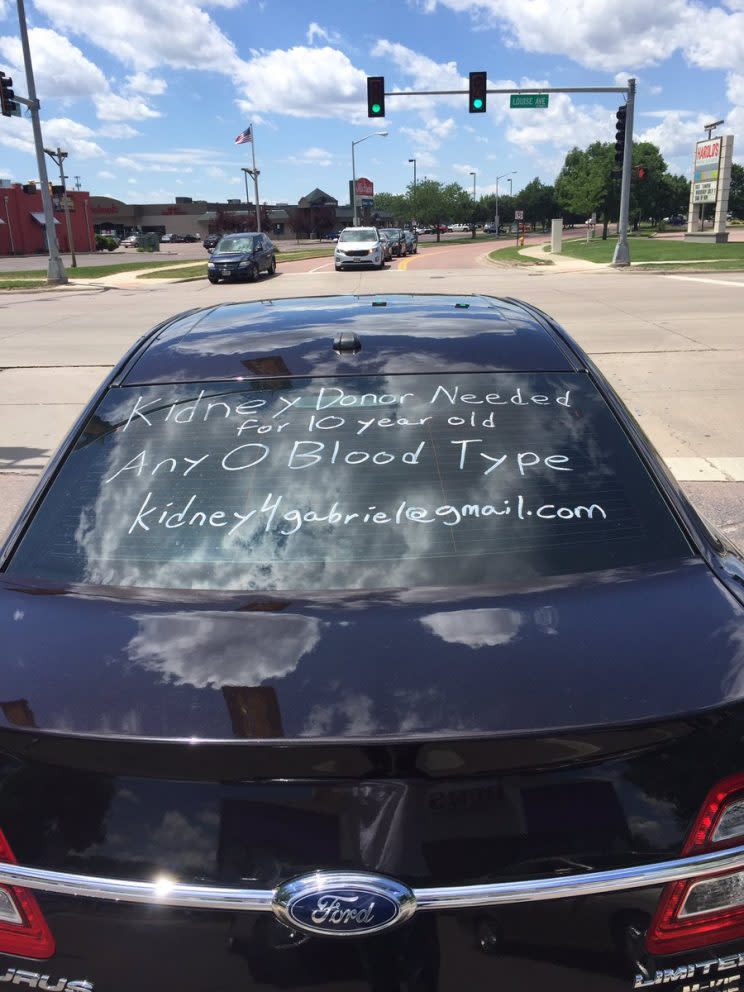People Are Offering to Be Kidney Donors for a 10-Year-Old Boy on Twitter

Twitter is often where you see the worst of human nature — bullying, trolling, hate speech, you name it. Every once in a while, though, Twitter displays the best of human nature too. Just this week, when a young man in Sioux Falls, S.D., saw writing on a car window seeking a kidney donation for a 10-year-old boy, he took to Twitter to share what was needed. And Twitter rewarded him by showing the kind of good the online community can do.
“Figured I would try, seen in Sioux Falls Twitter do your thing?” Luke Wiese wrote on Monday, with a photo of the car featuring the quest for a kidney written on its back windshield. That tweet has since been retweeted more than 10,000 times, and a couple of people have, indeed, reached out to the family to help.
Marisa Baumgart, an 18-year-old in Sioux Falls, is one of those people. Baumgart isn’t even sure how Wiese’s tweet made it into in her feed, but she found herself called to help.
“All of a sudden, I felt this push, and I was like, ‘Maybe I should just go for it. Maybe I should find out,'” Baumgart tells Yahoo Beauty. “At first, I wasn’t even sure if you can live with one kidney, but I guess you can.”
Figured I would try, seen in Sioux Falls Twitter do your thing? pic.twitter.com/ko9htRgaDi
— Luke Wiese (@wieseluke) June 19, 2017
The potential recipient is Gabriel Broghammer, a boy with a congenital kidney defect who received a kidney from his father at 16 months old, according to an article from the Rapid City Journal that someone shared in Wiese’s thread. Unfortunately, that kidney began failing almost seven years ago, and now he has been on the waiting list for a new kidney for a year. He is on dialysis, which requires Gabriel and his mother have to stay at a Ronald McDonald House in Sioux Falls, 300 miles from their home in Rapid City. The family’s GoFundMe page (which asks for a kidney, not money) says that because this is a second transplant, only 4 percent of the donor population is a match.
“We have to spread the word,” Broghammer’s mother, Christine, told the paper. “We need more people to get tested.”
The family doesn’t use Twitter, so they didn’t know about the initial tweet until their plea had gone viral. “When my nephew told us that someone who knows someone tweeted the info on our car window and it got over 600 responses in nine hours, we were shocked,” Don Broghammer, Gabriel’s father, tells Yahoo via email. “The emails have not stopped since. We have gotten close to 100 emails from people all over the U.S. wanting to help. … We are humbled by the selflessness of people out there. Total strangers are willing to donate a kidney. It’s amazing.”
After receiving Baumgart’s interest, Christine sent her a questionnaire and basic information on donating a kidney. While she waits to see whether she’ll be a match for Gabriel, the idea of going through major surgery for a stranger doesn’t seem to faze her.
“You know what, I’m young; I can handle it,” she tells Yahoo. “I’ve had a really tough year, this last year, and I felt like I lost myself for a while. Now, maybe I can give back and do something to help out, because I know what it’s like to be in that very scary position and feel hopeless, like no one is going to help you. Why not do something to help in the best way possible?”
A few others came forward on Twitter to offer their help as well, so things may be looking up for the Broghammers. The typical wait for a kidney is three to five years, according to DonateLife.net, and most living kidney donations are from family members.
Researchers at Georgetown University recently studied why some people are altruistic enough to give their organs to a stranger. In a computer exercise they were asked to allocate theoretical money to a stranger, a family member, or a friend, or keep it for themselves. Those who had donated a kidney consistently gave as much to strangers as the control group did to family and friends.
“They don’t tend to view a stranger or even an acquaintance as any less deserving of resources,” Kruti M. Vekaria, a doctoral candidate who worked on the study, told the Washington Post of the donors.
Baumgart hasn’t told everyone of her generous offer yet, but she plans to go through with this no matter what others say. If she doesn’t turn out to be a match for Gabriel, she might try to donate to someone else instead. Additionally, she doesn’t understand the many replies people are sending to the original tweet saying they would sell their kidney to Gabriel.
“Why can’t you live with the richness of [the fact that] you did something good for someone, and he gets to have a good life once he gets his kidney?” she asks. “That’s the biggest reward, not money.”
If you, too, feel like that reward might be enough, and you have type O blood, email Gabriel’s parents at [email protected].
Follow us on Instagram, Facebook, and Pinterest for nonstop inspiration delivered fresh to your feed, every day. For Twitter updates, please follow @YahooStyle and@YahooBeauty.
